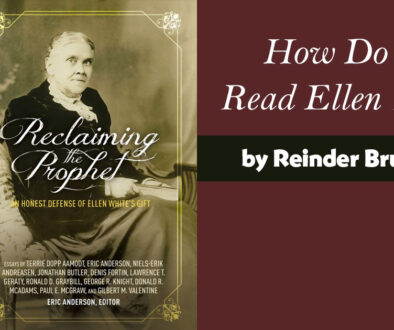Folk Theologies
by Loren Seibold | 30 March 2023 |
For a long time I’ve been noticing what I call “folk theologies”—notions that are commonly assumed among believers, though no one can show any evidence for them. These are simplistic concepts that come about for reasons that have little to do with the Bible, but take up residence in the collective mind of the Christian community.
The ones I’ll describe here aren’t especially harmful, and may even have some value as lessons to children. But they aren’t biblical.
And, as I’ll note at the end, folk theologies aren’t always so innocuous.
Books on the Bible
Years ago when I was a young pastor I was talking to a woman who felt herself (with considerable justification) not to have lived a very productive Christian life. As she was enumerating the tragedies and transgressions that added up to her personal story, she added this: “But pastor, in all of my life, I have never laid another book on top of the Bible.”
This is an example of a folk theology. There is nothing in the Bible about the order in which you stack books. In Bible times there were no books such as we have today. This idea comes from lessons offered to little children in Sabbath School to teach them respect for the Bible. It had stuck with her, though—the one thing that she could draw on to claim a bit of spiritual awareness, even though what was in the book, she admitted, she hadn’t absorbed particularly well.
I was taught about Bible stacking, too. I remember wondering, at an early and rather literal age, whether I could carry my Bible next to my Primary Treasure, because if it was held at my side, one document wasn’t clearly on top. Or what happened when you put your Bible upright on a bookshelf? Can you stack two Bibles on top of each other?
Later I heard a pastor say that old Bibles had to be disposed of by a special burning ritual, leading to more questions about the status of the Bible as a physical book.
The idea that the Bible was to be honored as an object evolves from the belief that the Bible’s message is singular and spiritually vital. The instruction that “When you lay your Bible down, don’t put anything on top of it” is a physical expression of the Bible’s importance. Remember when the Sabbath School teacher said, “How many of you have your Bibles today? Hold them up!”? A similar thing: pieces of printed paper bound together with glue and covered with leather were the proxy for the truths in the book.
But of course the object is far easier to honor than the contents.
If there’s a source for this idea, it’s probably how Jews treat the Torah and Muslims the Qur’an. Rabbis teach “the ladder of holiness,” which has explicitly to do with book stacking
As a physical expression of this ladder of holiness, the Talmud prescribes that a Sefer Torah [a hand-copied Torah] can be stacked upon another Sefer Torah, but an individual book of the Five Books of the Torah could not be put on top of a Sefer Torah. Similarly, a single book of the Five Books could be put on top of books of the Prophets or books of the Writings, but not vice versa.
Islam, too, has restrictions on the handling of the book. They would “consider it inappropriate, for example, to place a general text book on top of the Qur’an in a pile and would never toss one around or treat it carelessly.”
It is a good thing to treat a Bible—indeed, any good book—with care, though it seems to me that respecting the physical Bible is a minor consideration compared to taking seriously the meaning of the words in it.
Stars in your crown
My wife tells of feeling troubled as a child that she wouldn’t have any stars, or jewels, in her crown in heaven because she’d never been responsible for winning a soul to Christ. Mother to the rescue: “You’ll have at least one,” her mom told her, “because you were responsible for your own decision to follow Jesus.” That was enough to put her child’s heart at rest.
While there are many references to crowns in the Bible, the precise formulation of earning crown jewels for souls doesn’t appear.
Daniel 12:3 says:
And they that be wise shall shine as the brightness of the firmament; and they that turn many to righteousness as the stars for ever and ever.
Here wise believers are metaphorical stars, but there is nothing about their being awarded to the saints for soul winning. This text is reflected in William Cushing’s 1856 hymn “When He Cometh,” in which souls are jewels in Christ’s crown, not ours.
When He cometh, when He cometh
To make up His jewels,
All His jewels, precious jewels,
His loved and His own:
Like the stars of the morning,
His bright crown adorning,
They shall shine in their beauty,
Bright gems for His crown.
We Adventists can look a bit closer to home for one source of this idea. In Ellen White’s 1846 book The Daystar, she describes a scene of the 144,000 gathered in heaven, and says, “Some crowns appeared hung [heavy] with stars, while others had but few.”
A few years later, in Testimonies, Volume 3, she writes, “It is their privilege to have stars in their crown because of souls saved through their instrumentality.”
Dirk Anderson, in an excellent essay on the topic, points out that there are previous sources. One is Methodist leader Phoebe Palmer’s 1845 book, Entire Devotion to God, which was in Ellen White’s library. Writes Anderson,
Palmer makes it abundantly clear that “stars” in the crown are the reward of those who work diligently for the Lord. A lack of stars indicates one who did not do much work for the Lord. As proof of her theory, she quotes a man who supposedly had a heavenly vision: “He noticed the crowns differed greatly in brilliancy. Some were beautifully set with stars, while others were almost or quite starless.”
Since we know Ellen White was a prodigious borrower, could she have sourced this idea from Palmer? Possibly, but it seems just as likely that this bit of folk theology was floating around, perhaps as a way of teaching soul-winning to the young—as Ellen White once said, to “Inspire [children] with ambition to gain stars for their crown by winning many souls from sin to righteousness.” (Anderson notes a reference to it as early as a 1787 Methodist magazine.)
Hymns both reflect and perpetuate notions present in the culture. Note the second verse of E. E. Hewitt’s 1897 “Will There Be Any Stars?”
In the strength of the Lord let me labor and pray,
Let me watch as a winner of souls;
That bright stars may be mine in the glorious day,
When His praise like the sea-billow rolls.
Will there be any stars, any stars in my crown
When at evening the sun goeth down?
When I wake with the blest in the mansions of rest,
Will there be any stars in my crown?
The Bible says that saints will be rewarded for faithfulness (“Well done, my good and faithful servant… enter into the joy of your master!” Matthew 25:21), but that the reward for souls won will be displayed in heavily laden crowns doesn’t seem to have biblical support. It seems more probable that those reckoned as saints will have done their work for Jesus, not jewelry.
So likewise you, when you have done all those things which you are commanded, say, “We are unprofitable servants. We have done what was our duty to do.” Luke 17:10.
Harmless or bad?
Many of these folk theologies originated with someone’s trying to make the Bible’s teachings meaningful to children, and these simplified lessons were subsequently grandfathered into adult theology. People hold on to them, I suspect, because so many of the theologians’ complexities are at best marginally helpful to ordinary folks, and tend to just clutter our minds with abstractions.
There is little harm in the above examples, and possibly some helpful lessons. Other childish theologies, though, aren’t nearly so benign. Children who have been raised with the folk theology that God loves only obedient children and is angry at disobedient ones end up with a rather twisted view of God. Ellen White once wrote,
God hates unruly children who manifest passion, evil tempers, etc. He cannot save them in the time of trouble. They will be eternally lost.
—along with their parents, she adds.
This turns God from a loving being of generous and kind disposition into a stern and angry one—and it’s not accidental that many Adventist adults still see God as more about judgment than grace, and treat others accordingly. Theologies of legalism and fear, theologies that are tribal and excluding and even hateful, are also folk theologies that appeal to immature minds.
Such ideas are far from harmless. No one’s happiness is going to be affected by whether Bibles are stacked properly, but it will by being taught that God is angry and demanding about little things—a Being mostly interested in what we eat or what church we belong to or whether we go swimming on Sabbath afternoon. No one’s spiritual growth depends on what kind of crown you expect in heaven, but it does make a difference if you believe in a petty God who values insignificant conformities more than character and kindness.
We Adventists have, I fear, become too familiar with this immature view of God. What will it take to make more of us see God as great, gracious, and understanding, rather than petulant and unlikable?
 Loren Seibold is the Executive Editor of Adventist Today. This piece was previously printed in Intersections, the parish magazine of the Glendale City Church in California.
Loren Seibold is the Executive Editor of Adventist Today. This piece was previously printed in Intersections, the parish magazine of the Glendale City Church in California.
Graphic photo by Tim Wildsmith from Unsplash




